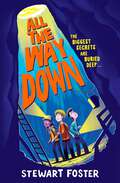- Table View
- List View
All the Trouble in the World: The Lighter Side of Overpopulation, Famine, Ecological Disaster, Ethnic Hatred, Plague, and Poverty
by P. J. O'RourkeWith All the Trouble in the World, P. J. O'Rourke once again landed on best-seller lists around the country, confirming his reputation as the pre-eminent political humorist of our time. Attacking fashionable worries—all those terrible problems that are constantly on our minds and in the news, but about which most of us have no real clue—P. J. crisscrosses the globe in search of solutions to today's most vexing issues, including overpopulation, famine, plague, and multiculturalism, and in the process produces a hilarious and informative book which ensures that the concept of political correctness will never be the same again. "One of the funniest, most insightful, dead-on-the-money books of the year."—Los Angeles Times; "All the Trouble in the World is O'Rourke's best work since Parliament of Whores."—The Houston Post; "The dispatches are unfailingly funny....Mr. O'Rourke gets to the heart of the matter with a steady stream of wisecracks....Economists, political scientists and sociologists are inclined to approach the ills of society with regression analysis. P. J. O'Rourke just points and laughs. Not surprisingly, it is Mr. O'Rourke who gets it right."—The Washington Times; "Bottom line: Buy the book."—The Wall Street Journal.
All the Truth
by Laura BrodieOne night can alter a life forever... Emma Greene enjoys living in rural solitude with her husband and five-year-old daughter, Maggie, far away from her college students in Jackson, Virginia. But late one night, with her husband away and her daughter upstairs in bed, some of Emma's students trespass on her property. The ensuing confrontation changes Emma and Maggie's life forever. Nine years later, still plagued by nightmares from that evening, Maggie is living with her father in the same small town, and entering her first year of high school. She develops problems in class when her math teacher, a strange and lonely woman, begins to exhibit an odd interest in her. In order to let go of the past, Maggie begins to piece together all the truth of what happened that night--and discovers a story of anger, guilt, and redemption.
All the Truth I Can Stand
by Mason StokesA gay teenager in 1990s Wyoming must contend with the violent loss of a loved one in this historical YA novel that draws from the tragic murder of Matthew Shepard in 1998.Juniper, Wyoming, high school student Ash is still reeling from his mother&’s death and ostracization by his friends when his father signs him up to join the crew for a college production of Oklahoma! Ash is slowly drawn out of his shell by student reporter Jenna and the star of the show, Shane, with whom a romance slowly blooms. Shane is talented, sensitive, and magnetic, but also deeply troubled. When Shane is found brutally beaten and unconscious, Jenna and Ash are shattered. And after Shane dies, they watch his death become a rallying point for gay rights advocates, and they wonder what the full story is and if they truly knew Shane at all. All The Truth I Can Stand is a heartbreaking exploration of grief and legacy, and details the good and the bad that can come to pass when an imperfect person is made into a symbol.
All the Truth Is Out: The Week Politics Went Tabloid
by Matt BaiThe former chief political correspondent for The New York Times Magazine brilliantly revisits the Gary Hart affair and looks at how it changed forever the intersection of American media and politics.In 1987, Gary Hart-articulate, dashing, refreshingly progressive-seemed a shoo-in for the Democratic nomination for president and led George H. W. Bush comfortably in the polls. And then: rumors of marital infidelity, an indelible photo of Hart and a model snapped near a fatefully named yacht (Monkey Business), and it all came crashing down in a blaze of flashbulbs, the birth of 24-hour news cycles, tabloid speculation, and late-night farce. Matt Bai shows how the Hart affair marked a crucial turning point in the ethos of political media-and, by extension, politics itself-when candidates' "character" began to draw more fixation than their political experience. Bai offers a poignant, highly original, and news-making reappraisal of Hart's fall from grace (and overlooked political legacy) as he makes the compelling case that this was the moment when the paradigm shifted-private lives became public, news became entertainment, and politics became the stuff of Page Six.From the Hardcover edition.
All the Truth That's In Me
by Julie BerryFour years ago, Judith and her best friend disappeared from their small town of Roswell Station. Two years ago, only Judith returned, permanently mutilated, reviled and ignored by those who were once her friends and family.
All the Truth That's In Me
by Julie Gardner BerrySpeak meets The Scarlet Letter in this literary masterpiece, the recipient of five starred reviews and nominated for the 2014 Edgar Award"All the Truth That's In Me is that rare magical thing--a beautiful love story told in spare, riveting prose."--The New York Journal of Books "The love story and the mystery . . . are mesmerizing. Berry's language undulates and flows. . . . Worthy of multiple reads."--The Boston GlobeThe paperback edition includes an exclusive interview with the author and a list of discussion questions for book clubs!Four years ago, Judith and her best friend disappeared from their small town of Roswell Station. Two years ago, only Judith returned, permanently mutilated, reviled and ignored by those who were once her friends and family.Unable to speak, Judith lives like a ghost in her own home, silently pouring out her thoughts to the boy who's owned her heart as long as she can remember--even if he doesn't know it--her childhood friend, Lucas.But when Roswell Station is attacked, long-buried secrets come to light, and Judith is forced to choose: continue to live in silence, or recover her voice, even if it means changing her world, and the lives around her, forever.Shortlisted for the Carnegie Medal A 2014 Edgar Award nominee for YAA YALSA Best Fiction for Young Adults Top Ten titleA Junior Library Guild SelectionA School Library Journal Best Book of 2013 and 2014 "Battle of the Books" contenderA Kirkus Reviews Best Teen Book for 2013A Horn Book Fanfare 2013 title A 2014 TAYSHAS Top Ten Pick
All the Voices
by Murray GitlinOriginally published in 1960, this novel tells the moving and thought-provoking story of an extraordinary white man married to a unique black woman.Coming from an ignorant and unambitious farm family, Claude Depler, after several years of unsuccessful job-hunting, finally makes a name and a place for himself as head of a community center in Chicago. Here he meets and marries an outstanding black woman whose name is nationally recognized as an enlightened and vigorous advancer of the American Negro’s interests. The larger part of their married life is spent in Milan, where Claude is now an administrator of a post-war refugee program.Their soul- searching inner struggles and their quest for peace of mind and heart, intimately involved with the problems of racial discrimination, are sensitively developed by the author.
All the Voices Cry
by Alice PetersenWINNER OF THE QWF FIRST BOOK PRIZE"Alice Petersen writes as eloquently about the natural world as she does about the world of human emotion and desire. This is a wise and impressive collection of stories."-David Bezmozgis, author of The Free WorldAlice Petersen's All the Voices Cry is masterful and potent-incredibly satisfying for a reader.- Kathleen Winter, author of AnnabelAn academic's wife, struggling to keep up with her husband's quest to find a long-dead author's Tahitian love-garden, realizes that her own idea of paradise no longer includes her husband. An architect dreams of slender redheads, Champlain's astrolabe, and a brush with mortality-and finds at least the latter at Danseuses 7 Jours. An elderly man boards a trans-Pacific flight in an attempt to elude the prediction of a psychic, only to understand too late how the prophecy has shaped his actions.In All the Voices Cry, modern life collides with all the old pushes and pulls: city and country, the global and the local, the ideal and the real. Petersen's characters chase the mirage of escape, and are brought up hard by reality. This is a book rooted in landscape, tangled in the brambles of personal history, and it introduces in Alice Petersen a wondrous new voice that is yours to discover.Alice Petersen is a writer and critic whose work has been shortlisted for numerous Canadian prizes and awards. She was born in New Zealand and now lives and works in Montreal, Quebec.
All the Wandering Light (Even the Darkest Stars #2)
by Heather FawcettThe second in a sweeping and action-packed fantasy duology loosely inspired by the early climbers of Mount Everest—perfect for fans of Tamora Pierce and Kristin Cashore.After the terrifying events on Mount Raksha, the witches have returned, and River has betrayed Kamzin to regain his dark powers. The witches’ next step: march on the Three Cities and take over the Empire—led by River’s brother, Esha.If Kamzin is to save Azmiri and prevent the destruction of the Empire, she must find a star that fell in the Ash Mountains to the north. Fallen stars have immense power, and if Kamzin and Lusha can find the star, they can use its magic to protect their homeland. To get there, Kamzin has allied with Azar-at, the dangerous and deceptive fire demon, who can grant her great power—in exchange for pieces of her soul. But River wants the star too, and as their paths collide in dangerous and unexpected ways, Kamzin must wrestle with both her guilt and her conflicted feelings for the person who betrayed her. Facing dark magic, a perilous journey, and a standoff against the witches, can Kamzin, Lusha, and Tem find the star and save their Empire?
All the Water I've Seen Is Running: A Novel
by Elias RodriquesFormer high school classmates reckon with the death of a friend in this stunning debut novel.Along the Intracoastal waterways of North Florida, Daniel and Aubrey navigated adolescence with the electric intensity that radiates from young people defined by otherness: Aubrey, a self-identified "Southern cracker" and Daniel, the mixed-race son of Jamaican immigrants. When the news of Aubrey’s death reaches Daniel in New York, years after they’d lost contact, he is left to grapple with the legacy of his precious and imperfect love for her. At ease now in his own queerness, he is nonetheless drawn back to the muggy haze of his Palm Coast upbringing, tinged by racism and poverty, to find out what happened to Aubrey. Along the way, he reconsiders his and his family’s history, both in Jamaica and in this place he once called home.Buoyed by his teenage track-team buddies—Twig, a long-distance runner; Desmond, a sprinter; Egypt, Des’s girlfriend; and Jess, a chef—Daniel begins a frantic search for meaning in Aubrey’s death, recklessly confronting the drunken country boy he believes may have killed her. Sensitive to the complexities of class, race, and sexuality both in the American South and in Jamaica, All the Water I’ve Seen Is Running is a novel of uncommon tenderness, grief, and joy. All the while, it evokes the beauty and threat of the place Daniel calls home—where the river meets the ocean.
All the Water in the World: A Novel
by Eiren CaffallIn the tradition of Station Eleven, a literary thriller set partly on the roof of New York’s Museum of Natural History in a flooded future."Gripping...tense, delightful and rich with resonance." —Scientific American"Captivating...The setting, the detailed emotive descriptions, and nail-biting adventure are incandescent." —Library Journal (starred)All the Water in the World is told in the voice of a girl gifted with a deep feeling for water. In the years after the glaciers melt, Nonie, her older sister and her parents and their researcher friends have stayed behind in an almost deserted New York City, creating a settlement on the roof of the American Museum of Natural History. The rule: Take from the exhibits only in dire need. They hunt and grow their food in Central Park as they work to save the collections of human history and science. When a superstorm breaches the city’s flood walls, Nonie and her family must escape north on the Hudson. They carry with them a book that holds their records of the lost collections. Racing on the swollen river towards what may be safety, they encounter communities that have adapted in very different and sometimes frightening ways to the new reality. But they are determined to find a way to make a new world that honors all they've saved. Inspired by the stories of the curators in Iraq and Leningrad who worked to protect their collections from war, All the Water in the World is both a meditation on what we save from collapse and an adventure story—with danger, storms, and a fight for survival. In the spirit of From the Mixed-Up Files of Mrs. Basil E. Frankweiler and Parable of the Sower, this wild journey offers the hope that what matters most – love and work, community and knowledge – will survive.
All the Water in the World: A Novel
by Karen RaneyA stunning debut novel about a teenage girl and her mother as they grapple with first love, family secrets, and tragedy.Maddy is sixteen. Smart, funny, and profound, she has loyal friends, a mother with whom she’s unusually close, a father she’s never met, devoted grandparents, and a crush on a boy named Jack. Maddy also has cancer. Living in the shadow of uncertainty, she is forced to grow up fast. All the Water in the World is the story of a family doing its best when faced with the worst. Told in the alternating voices of Maddy and her mother, Eve, the narrative moves between the family’s lake house in Pennsylvania; their home in Washington, DC; and London, where Maddy’s father, Antonio, lives. Hungry for experience, Maddy seeks out her first romantic relationship, finds solace in music and art, and tracks down Antonio. She continually tests the depths and limits of her closeness with her mother, while Eve has to come to terms with the daughter she only partly knows, in a world she can’t control. With unforgettable voices that range from tender to funny, despairing to defiant, this novel illuminates the transformative power of love, humor, and hope.
All the Water in the World: Shortlisted for the COSTA First Novel Award
by Karen RaneySHORTLISTED FOR THE COSTA FIRST NOVEL AWARD'VERY MOVING, A WARM AND COMPASSIONATE NOVEL' Diana Evans'TENDER, HEARTFELT AND HEART-BREAKING' Francis SpuffordOptioned for film by Monumental Pictures/Lionsgate. Maddy is sixteen. She has loyal friends, a mother with whom she's unusually close, a father she's never met, devoted grandparents, and a crush on a boy named Jack. Maddy is also dying.Told alternately by Maddy and her mother, Eve, All the Water in the World is a heart-breaking story of a family doing its best when faced with the worst, and a poignant testimony to the transformative power of love.'DEEPLY REWARDING AND WHOLLY UNFORGETTABLE' Bret Anthony Johnston'CAPTIVATING AND WARM AND REAL' Janet Ellis 'ASTONISHINGLY MOVING' Joanna Hershon'A TENDER BRUISE OF A NOVEL' Mary Paulson-EllisOptioned for film by Monumental Pictures/Lionsgate.
All the Water in the World: Shortlisted for the COSTA First Novel Award
by Karen Raney'TENDER, HEARTFELT AND HEART-BREAKING' Francis Spufford'VERY MOVING, A WARM AND COMPASSIONATE NOVEL' Diana Evans'DEEPLY REWARDING AND WHOLLY UNFORGETTABLE' Bret Anthony Johnston'CAPTIVATING AND WARM AND REAL' Janet Ellis 'ASTONISHINGLY MOVING' Joanna Hershon'A TENDER BRUISE OF A NOVEL' Mary Paulson-EllisMaddy is sixteen. Deeply curious, wry and vivacious, she's poised at the outset of adulthood. She has loyal friends, a mother with whom she's unusually close, a father she's never met, devoted grandparents, and a crush on a boy named Jack. Maddy also has cancer. Eve is her mother, desperately caring for the daughter she loves and only partly knows, in a world she can't control.For fans of Celeste Ng, Jodi Picoult and Delia Owens, All the Water in the World is the story of a family doing its best when faced with the worst. Unforgettable and singularly moving, with voices that range from tender to funny, despairing to defiant, this novel is a poignant testimony to the transformative power of love, humour and hope.'RANEY IS AN AUTHOR TO WATCH' Booklist'EXQUISITE' KirkusOptioned for film by Monumental Pictures/Lionsgate.(P) 2019 Simon & Schuster, Inc
All the Way
by Andy BehrensA road trip becomes the "sex drive" when Ian convinces his best friends to travel 900 miles with him so he can meet Danielle, an online friend who just might have sex with him.
All the Way Around the Sun
by XiXi TianFrom the acclaimed author of This Place Is Still Beautiful comes an evocative, achingly romantic road-trip story about grief, diasporic identities, and the deep-buried secrets that haunt us, perfect for fans of Past Lives and The Farewell.Stella Chen’s life ground to a halt when her brother unexpectedly passed away a year ago. Raised together by their grandmother for years in the Chinese countryside before rejoining their parents in the United States, his absence destroys the connective tissue in her family. With another jarring move her senior year, from rural Illinois to unfamiliar surroundings in San Diego, she is left alone and adrift in her family’s suffocating silence and the void of unanswered questions her brother left behind.So when Stella’s parents force her to join her estranged childhood friend Alan Zhao for a college tour all over California, Stella dreads it. Alan is a reminder of everything Stella wishes she could be—popular, gregarious, unburdened—and a reminder of how lost she is.As this road trip takes Stella and Alan down beautiful coastlines and through fraught family dynamics, Stella can’t help but feel the spark of why she and Alan were once so close. Before long, they find themselves pulled into each other’s orbits, forcing unspoken feelings and long-hidden truths into the light.
All the Way Down
by Stewart FosterA life-affirming story about friendship, adventure and self-belief, from the award-winning author of The Bubble Boy. Perfect for fans of Louis Sachar&’s Holes and Elle McNicoll&’s A Kind of Spark. When three eleven-year-old &‘problem children&’ are thrown together at summer camp, they&’re challenged to build a place to live together for the next week. But after a trip to a disused tin-mine goes awry, Milo and his new friends, Oscar and Effie, soon find themselves split off from the group and trapped underground. Can they work through their individual issues and come together as a team to find their way to freedom?
All the Way Gone: A Detective Annalisa Vega Novel (Detective Annalisa Vega #4)
by Joanna SchaffhausenThe fourth installment in the beloved Detective Annalisa Vega seriesIs there such a thing as a good sociopath? Newly minted private investigator Annalisa Vega is skeptical, but her first client, Mara Delaney, insists that some sociopaths are beneficial to society. Mara has even written a book titled The Good Sociopath centered around Chicago neurosurgeon Craig Canning. Dr. Canning has saved hundreds of lives so it shouldn’t matter that he doesn’t actually care about his patients, should it? But Mara has a more urgent problem, she is now concerned that Canning might not be such a good sociopath after all. A young woman in Canning’s apartment building mysteriously plunged to her death from a balcony, and Mara fears Canning could be responsible. She needs to uncover the truth about Canning before the book comes out, so Annalisa has little time to search for answers.Annalisa quickly discovers that more than one person wanted the young woman dead. Canning insists he didn’t do it. His charming, unflappable demeanor suggests that either he’s telling the truth or Mara is right and he’s cold-hearted to the core. But the cops believe the girl’s death was an accident. The more Annalisa probes, the more she becomes convinced it’s a fiendishly clever murder, one only a brilliant psychopath could pull off. She draws deeper into a battle of wits with Canning, so determined to prove his guilt that she forgets Mara’s most important warning—that sociopaths only care about winning at all costs. When Annalisa finally peels back the layers of deceit to reveal the horrifying truth of the girl’s death, she may be too late to save herself..
All the Way Happy
by Kit ColtraneTheir differences made them enemies. One summer tied them together forever. From the moment Jack Gardner first laid eyes on Theodore Beaumont, he hated everything about him. Emanating wealth and icy perfection, Theo was everything Jack was not. Their time together at the elite Gwynns Academy changed them both, but it wasn't until a chance encounter the summer after graduation that the tension between them became palpable—unbearable.* Seventeen years later, Jack&’s and Theo&’s worlds collide as they drop their sons off at Gwynns. Theo wants the kind of authentic life that requires confronting past lies—specifically the steamy summer affair he and Jack kept buried like a secret beneath the floorboards of their marriages. Jack is…less than convinced. Existing in the present and simultaneously in their shared past, in the richness of their memories and the way they once clung together, Jack and Theo struggle to reconcile the worlds they have built apart with their longing to be together—and the fear of being hurt all over again.
All the Way Home
by Patricia Reilly GiffIt's August 1941, and Brick and Mariel both love the Brooklyn Dodgers. Brick listens to their games on the radio in Windy Hill, in upstate New York, where his family has an apple orchard; Mariel, once a polio patient in the hospital in Windy Hill, lives in Brooklyn near the Dodgers' home, Ebbets Field. She was adopted by Loretta, a nurse at the hospital, and has never known what happened to her own mother. Someday, somehow, she plans to return to Windy Hill and find out. When a fire destroys their orchard, Brick's parents must leave the farm to find work. They send him to live in Brooklyn with their friend Loretta, even though Brick knows that their elderly neighbors need his help to pick what's left of the apples. The only good thing about Brooklyn is seeing the Dodgers play-that, and his friendship with Mariel. Maybe, together, they'll find a way to return to Windy Hill, save the harvest, and learn the truth about Mariel's past.From the Hardcover edition.
All the Way Home
by Wendy Corsi StaubNew York Times–bestselling Author: &“Staub&’s scary plot expertly mixes teen and adult perspectives and themes . . . keeps readers guessing.&” —Publishers Weekly For ten years, Rory Connelly has been haunted by the memory of her rebellious older sister Carleen, who vanished from her bed one night and was never seen again. When Rory returns home to care for her ailing mother and teenage sister in upstate New York, she discovers a family that has never recovered from the tragic events of so long ago. That summer, the quiet little town of Lake Charlotte was torn apart when four teenage girls vanished—a mystery that still puzzles its residents. Now, a decade later, on the anniversary of the first disappearance, another girl goes missing, and the community is consumed with fear. Rory is about to relive her worst nightmare—only this time, her own life is at stake . . . &“If you like Mary Higgins Clark, you&’ll love Wendy Corsi Staub.&” —#1 New York Times–bestselling author Lisa Jackson
All the Way Home and All the Night Through
by Ted LewisAn English art school Casanova wrestles with his personal demons in this jazzy, sexy and seemingly autobiographical first novel by the author of Get Carter Victor Graves is in his last year at Hull Art School. The handsome pianist for a jazz ensemble that plays the local pub circuit, Victor has a way with words and women, but struggles with personal demons--alcohol chief among them--that increasingly get the better of him. But Victor's wildness meets its match in the gorgeous and sensitive Janet, whose hard-to-get routine awakens in Victor a desire to leave-off his rakish ways. But Victor's caddish life as top man on campus comes screeching to a halt after graduation, when booze, lack of focus, and deep-seated insecurities slowly get the better of him. Jobless and increasingly alienated from Janet and his friends, Victor lets his misanthropic tendencies grow stronger, until they are unbearable. All the Way Home and All the Night Through is a stirring portrait of a young man inadvertently tearing down himself and those he holds dear.
All the Way to America: The Story of a Big Italian Family and a Little Shovel
by Dan YaccarinoThis is the story of four generations of an Italian American family. It begins with an immigrant who came through Ellis Island with big dreams, a small shovel, and his parents' good advice: "Work hard, but remember to enjoy life, and never forget your family."Now, many years later, the man's great-grandson, Dan Yaccarino, tells how he succeeded, and how the little shovel has been passed from father to son--along with the good advice.It's a story that captures the experience of so many American families. One that will have kids asking their parents and grandparents, where did we come from? Tell me our story.
























